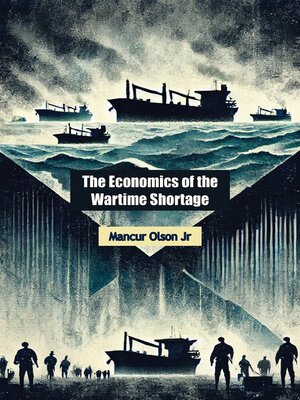The Economics of the Wartime Shortage
ebook ∣ : A History of British Food Supplies in the Napoleonic War and in World Wars I and II
By Mancur Olson Jr

Sign up to save your library
With an OverDrive account, you can save your favorite libraries for at-a-glance information about availability. Find out more about OverDrive accounts.
Find this title in Libby, the library reading app by OverDrive.



Search for a digital library with this title
Title found at these libraries:
| Library Name | Distance |
|---|---|
| Loading... |
Mancur Olson Jr.'s The Economics of the Wartime Shortage provides a detailed and insightful analysis of how Britain managed its food supplies during three pivotal conflicts: the Napoleonic Wars, World War I, and World War II. Combining economic theory with historical case studies, Olson examines the challenges of maintaining food security in times of crisis and the policies and strategies employed to overcome them.
The book delves into the economic mechanisms that drive wartime shortages, from disruptions in international trade and blockades to domestic production constraints. Olson explores how these pressures shaped Britain's agricultural policies, rationing systems, and government interventions to ensure the population's survival and morale during periods of prolonged conflict.
Through comparative analysis, Olson highlights the similarities and differences in how Britain addressed these crises across three wars. He provides a nuanced view of how technological advancements, shifts in economic thinking, and political leadership influenced the nation's ability to adapt to extreme circumstances.
Rich in historical detail and supported by rigorous economic analysis, The Economics of the Wartime Shortage offers valuable insights into the relationship between economics and policy in times of national emergency. This book is an essential read for historians, economists, and anyone interested in the intersection of war, resource management, and human resilience.
The book delves into the economic mechanisms that drive wartime shortages, from disruptions in international trade and blockades to domestic production constraints. Olson explores how these pressures shaped Britain's agricultural policies, rationing systems, and government interventions to ensure the population's survival and morale during periods of prolonged conflict.
Through comparative analysis, Olson highlights the similarities and differences in how Britain addressed these crises across three wars. He provides a nuanced view of how technological advancements, shifts in economic thinking, and political leadership influenced the nation's ability to adapt to extreme circumstances.
Rich in historical detail and supported by rigorous economic analysis, The Economics of the Wartime Shortage offers valuable insights into the relationship between economics and policy in times of national emergency. This book is an essential read for historians, economists, and anyone interested in the intersection of war, resource management, and human resilience.







